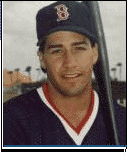 | ||||||||||||||||||||||||||||||||||||||||||||||||||||||||||||||||||||||||
September 23, 2002 | ||||||||||||||||||||||||||||||||||||||||||||||||||||||||||||||||||||||||
|
Rookie Leaders
Who will win the Pat Listach Rookie of the Year Award? It's more uncertain than a Florida primary as several freshmen distinguished themselves with impressive 2002 campaigns. The voters will have a tough time sorting through some very deserving candidates. Young Guns Last year, Carolina's Barry Zito went 13-6 with a 3.47 ERA, 158 Ks and 12.9 R/9 to become the first starting pitcher to win the Pat Listach Rookie of the Year Award. History could repeat itself this year as several young hurlers stepped to the forefront with tremendous rookie campaigns worthy not just of the ROY, but of Ben McDonald Pitcher of the Year Award consideration. The first rookie pitcher to ever start the All-Star Game, Columbia's Mark Buehrle led all pitchers, not just rookies, in earned run average (2.32), runners per 9 IP (9.2) and quality start percentage (.806). In addition to ERA, R/9 and QS%, Buehrle led the freshman class in innings (224.2), complete games (5) and BB/9 (1.2); tied for the lead in shutouts (2); second in wins (18), H/9 (7.6) and K:BB (4.00); third in winning percentage (.667); and sixth in strikeouts (124). All this despite pitching for a team that finished 10 games under .500, an offense that gave him just 3.8 runs per start and a bullpen that allowed 41.7 percent of his runners left to score -- the league averages were 4.8 RPS and 32.1% RLS. The first pitcher taken in the 2002 draft, Roy Oswalt was grabbed with the second pick by the Sharks to fill out one of the best young rotations in baseball. Oswalt had a solid rookie campaign, but his numbers don't rate up there with Buehrle and Pineiro, the two starters drafted immediately after him. He did lead the freshman class in strikeouts (183) and K:BB (4.16), and, also among rookies, finished second in innings (217.0), complete games (4) and BB/9 (1.8); third in ERA (3.53); fourth in BR/9 (12.0); and seventh in wins (11) and winning percentage (.478). Among all pitchers, he finished 9th in ERA and Ks.
Two rookie relievers (Kaz Sasaki and Ray
King) finished in the Top 5 of last year's
balloting, but don't look to the bullpen for this
year's award winner. Only a handful of freshman
firemen deserve any consideration as this year's top
rookie. Hoboken's Danys Baez (6-2, 2.81 ERA,
10.4 R/9) led all rookie relievers in ERA and holds
Other notables: One of just two rookie pitchers at the All-Star game, Brandon Duckworth (12-7, 4.20, 14.3) had a mediocre second half (4-5, 4.59), and his teammate Pineiro blew past him in the ROY running... Stanhope's Erik Hiljus (15-8, 4.14, 12.8), on the other hand, made himself a candidate with a great finish (7-5, 3.09). Among rookies, Hiljus ranked second in Ks (176), third in wins, fifth in innings (197.2), sixth in ERA and tied for sixth in R/9 (12.8)... Vancouver's Brandon Lyon (13-6, 4.09, 11.9) had the second-best winning percentage (.684) among rookies, and was third in R/9, fourth in wins and fifth in ERA... Brooklyn's Dave Williams (7-13, 3.64, 13.1) flirted with the ERA title for the first two months of the season, but was out of the Top 10 by the end of the season. He finished fourth among rookies in ERA and fifth in R/9. Thunder and Lightning The offensive categories were dominated by two types of rookies: Those who run fast, and those who don't have to. Two batters dominated the rookie leaderboard, each exemplifying a different kind of offense.
The first player selected in the 2002 draft, Albert Pujols (.318, 29 HR, 108 RBI) immediately started paying dividends, hitting .335 with 23 HRs and 74 RBIs in the first half and was named the Morris Division's starting first baseman in the All-Star Game, the only rookie batter in either team's starting lineup. Pujols split his time between first and left field -- though he played neither very well -- as well as emergency duty at second, third and short. He cooled off somewhat over the second half, but nevertheless led the freshman class in doubles (50), home runs, runs scored (108), runs batted in, walks (55), total bases (351), on-base percentage (.386), slugging percentage (.548), OPS (.934) and runs created (131.5). Among all batters, Pujols finished second in hits (204), tied for third in doubles and was fourth in batting average. All this and he's just 22 years old! Being a rookie is hard enough -- but how about being a rookie for two teams? Three players were moved in the midst of their inaugural seasons, all jumped to teams higher in the standings, and each found happiness in his new home: Catcher Paul Lo Duca (.299, 17 HR, 72 RBI) got off to a slow start with Brooklyn (.240, .585 OPS, 1 HR, 4 RBI in 75 AB), but was dealt to Newark and immediately became a fixture in their lineup -- when he wasn't injured -- hitting .311 with an .869 OPS in 367 ABs with his new team. Among rookies, Lo Duca finished second in home runs, runs batted in, on-base percentage (.356), slugging percentage (.466) and OPS (.822). In the post-season, the Duke had a huge series in the second-round playoff against Vancouver, hitting .400 with a 1.181 OPS, 6 R and 8 RBI... Juan Pierre (.302, 76 R, 18 SB) has been called a poor man's Ichiro -- so what do you do with him, if you already have Ichiro? That was the question being asked in Phoenix, where the lesser of the slap-hitting speedsters was off to a ho-hum start (.255, .296 OBP, 28 R, 4 SB in 278 AB). Swapped to Hoboken for Garret Anderson, Pierre suddenly kicked on the after-burners, making Ichiro look like the cheap foreign knock-off by hitting .342 with a .395 OBP, 48 R and 14 SB in 319 AB, while playing an above-average center field. Among rookies, Pierre finished third in stolen bases and on-base percentage (.349) and fourth in batting average, runs and hits (180)... Shawn Wooten (.308, 5 HR, 87 R) actually tailed off a little after he was traded from Stanhope to Vancouver midway through the season, but was a tremendous upgrade at catcher both offensively and defensively for the Iron Fist, who had been struggling with a platoon of Ben Petrick and Todd Hundley that combined to hit .198 in 263 ABs and had thrown out just 6 of 43 basestealers. Wooten gunned out 18 of 47, tops among rookies and third-best in the league, and made just one error behind the plate all season. Wooten also proved to be one of the team's top performers in the playoffs, leading the Iron Fist in batting average (.412), hits (14) and runs (6). Among rookies, Wooten was third in batting average, runs, and hits (184); however, he showed no power (13 2B, 3 3B, 5 HR in 598 AB), so his .308 batting average is rather empty (.329 OBP, .365 SLG, .694 OPS). He also walked just 7 times, with 123 strikeouts, for a K:BB ratio of 17.6 -- by far the worst among rookies.
Other notables: Carolina's A.J. Pierzynski (.283, 25 2B, 9 HR, 40 2B, .798 OPS in 314 AB) was off to a tremendous start, but missed almost the entire second half with injuries... Harrison's Chris Richard (.276, 30 2B, 7 HR, 35 R, 39 RBI) was sold to Japan in July... Speaking of Japan, Wanaque's Tsuyoshi Shinjo (.287, 20 2B, 38 R, 30 RBI) seems to have made the transition to U.S. pitching all right... Phoenix's Jason Tyner (.292, 44 R, 44 RBI, .651 OPS) tied for fourth in stolen bases (17) and was third in stolen base percentage (.773)... Honolulu's Mike Darr, largely used as a defensive replacement, hit .269 with a .387 OBP in just 52 ABs, but was tragically killed in a car wreck driving home after the Sharks were eliminated from the post-season on the second-to-last day of the season. Darr didn't have nearly enough at-bats to qualify for serious ROY consideration, but he does win the Steve Olin Award for his selfless dedication to the game. Darryl Kile is the early favorite for next year. Phil Plantier, one of the top prospects of the last decade, was picked by baseball guru Bill James in 1991 as the player most likely to lead the majors in HRs during the 1990s. In 1994, at age 24, he hit 47 round-trippers with 118 RBIs for the Charleston Chiefs, his first and last DMBL season. He's currently an analyst for Fox Sports Net. Click Here for past articles. | ||||||||||||||||||||||||||||||||||||||||||||||||||||||||||||||||||||||||
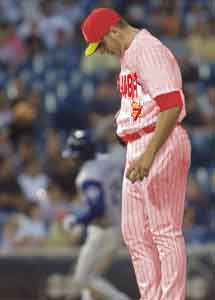 Hoboken's Joel Pineiro became the first rookie
to throw a
Hoboken's Joel Pineiro became the first rookie
to throw a 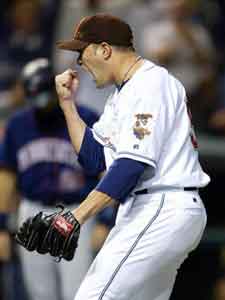 (16), was tied for first in saves (4), finished second
in R/9, K/9 (8.6) and K:BB (2.79), and third in games
(73). He allowed just 9 of 45 inherited runners to
score (.200), finishing fifth in the league and second
among rookies in that category... Vancouver's
Victor Zambrano (8-4, 2.97, 9.4) deserves at
least a passing look from the voters after leading
rookie relievers in wins, Ks (107), R/9, K/9 (9.6) and
K:BB (3.69), and finishing second in ERA.
(16), was tied for first in saves (4), finished second
in R/9, K/9 (8.6) and K:BB (2.79), and third in games
(73). He allowed just 9 of 45 inherited runners to
score (.200), finishing fifth in the league and second
among rookies in that category... Vancouver's
Victor Zambrano (8-4, 2.97, 9.4) deserves at
least a passing look from the voters after leading
rookie relievers in wins, Ks (107), R/9, K/9 (9.6) and
K:BB (3.69), and finishing second in ERA.
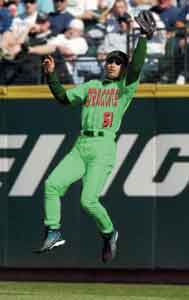 Selected by Phoenix in the 9th round of the 2001
draft, Ichiro Suzuki (.320, 99 R, 31 SB) spent
the 2001 season trying to work out his green card
troubles. He finally reached U.S. shores in time for
Spring Training and electrified fans with his
old-school punch-and-run style. Ichiro also played a
tremendous right field, not making an error all season
while racking up 16 baserunner kills, including three
double plays. But it was at the plate where Ichiro
really got it done. He led the league in hits (229),
stolen bases, at-bats (716) and plate appearances
(748), and finished third in batting average and steal
percentage (.886). He led the freshmen in all those
categories, and had a 17-game hitting streak, the
longest by a rookie this season. Also among rookies,
he was second in runs scored (99), runs created
(103.4) and total bases (294); tied for third in RBIs
(60); fourth in on-base percentage (.341); fifth in
OPS (.752) and doubles (28); and tied for fifth in
home runs (9).
Selected by Phoenix in the 9th round of the 2001
draft, Ichiro Suzuki (.320, 99 R, 31 SB) spent
the 2001 season trying to work out his green card
troubles. He finally reached U.S. shores in time for
Spring Training and electrified fans with his
old-school punch-and-run style. Ichiro also played a
tremendous right field, not making an error all season
while racking up 16 baserunner kills, including three
double plays. But it was at the plate where Ichiro
really got it done. He led the league in hits (229),
stolen bases, at-bats (716) and plate appearances
(748), and finished third in batting average and steal
percentage (.886). He led the freshmen in all those
categories, and had a 17-game hitting streak, the
longest by a rookie this season. Also among rookies,
he was second in runs scored (99), runs created
(103.4) and total bases (294); tied for third in RBIs
(60); fourth in on-base percentage (.341); fifth in
OPS (.752) and doubles (28); and tied for fifth in
home runs (9).
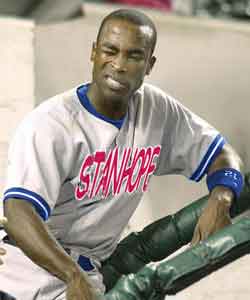 Up the middle: Stanhope's Alfonso Soriano
(.255, 15 HR, 55 RBI) showed surprising power for a
rookie second baseman, finishing second among rookies
in doubles (41), third in homers and runs created
(73.6), and sixth in both runs (66) and RBIs. He also
ranked fourth in stolen bases (17), and his .810
stolen base percentage was fourth-best in baseball;
there's talk he could be the league's next 40-40 man,
joining Larry Walker and Jeff Bagwell,
who both pulled off the feat in 1998. No one's done it
since... Four rookie shortstops had solid if
unspectacular first seasons: Arkansas's David
Eckstein (.265, 20 2B, 63 R, 8 SB), who will hope
to put his miserable World Series (.158, 1 R, 1 RBI)
behind him; Tijuana's D'Angelo Jimenez (.256,
52 R, 48 RBI), who finished second among rookies with
43 walks, and tied for third with 30 doubles;
Vancouver's Jimmy Rollins (.248, 25 2B, 12 3B,
70 R, 60 RBI), who finished second among rookies with
19 SB; and Phoenix's Juan Uribe (.242, 23 2B,
56 R, 59 RBI), who set a modern record with 20
triples.
Up the middle: Stanhope's Alfonso Soriano
(.255, 15 HR, 55 RBI) showed surprising power for a
rookie second baseman, finishing second among rookies
in doubles (41), third in homers and runs created
(73.6), and sixth in both runs (66) and RBIs. He also
ranked fourth in stolen bases (17), and his .810
stolen base percentage was fourth-best in baseball;
there's talk he could be the league's next 40-40 man,
joining Larry Walker and Jeff Bagwell,
who both pulled off the feat in 1998. No one's done it
since... Four rookie shortstops had solid if
unspectacular first seasons: Arkansas's David
Eckstein (.265, 20 2B, 63 R, 8 SB), who will hope
to put his miserable World Series (.158, 1 R, 1 RBI)
behind him; Tijuana's D'Angelo Jimenez (.256,
52 R, 48 RBI), who finished second among rookies with
43 walks, and tied for third with 30 doubles;
Vancouver's Jimmy Rollins (.248, 25 2B, 12 3B,
70 R, 60 RBI), who finished second among rookies with
19 SB; and Phoenix's Juan Uribe (.242, 23 2B,
56 R, 59 RBI), who set a modern record with 20
triples.